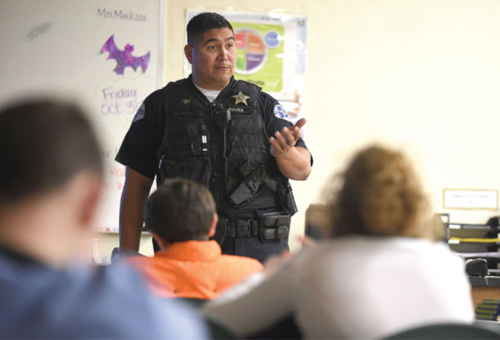

NCJTC offices will be closed December 24 - January 2 in observance of the upcoming holidays. We will be back to serve you in the new year on Monday, January 5, 2026. For information concerning continuing education units, please view our **[policies](https://ncjtc.fvtc.edu/policies#continuingeducation)** page.

November 1-2, 2023 | Cass Lake, MN
Access to this content requires approval.
Please watch your email inbox () for further instructions. You can expect to receive information regarding access within 1 business day.
Please watch your email inbox () for further instructions. You can expect to receive information regarding access within 1 business day.
You must add an organization to your profile before you can access this content.

November 1-2, 2023 | Cass Lake, MN
Explore Tribal Law Enforcement Intervention and Deflection (LEID) as a pathway to reduce unnecessary justice system involvement for individuals with substance use disorders and co-occurring mental health disorders by connecting them with appropriate treatment, behavioral health and social services. Review successful practices for identification, screening and referral of program participants. Examine relevant Tribal LEID case studies and successful program models. Participate in a six-step process to map out how to create a Tribal LEID program specific to your community, identify resources and key stakeholders, and identify action steps to initiate and evaluate your program.
Access to this content requires approval.
Please watch your email inbox () for further instructions. You can expect to receive information regarding access within 1 business day.
Please watch your email inbox () for further instructions. You can expect to receive information regarding access within 1 business day.
You must add an organization to your profile before you can access this content.
**Registration deadline is October 31, 2023** **This registration is for law enforcement officers only.** If you are not a law enforcement officer, please register for the 8 hour training session **[HERE.](http://ncjtc.fvtc.edu/trainings/TR02051280/TRI2052115/tribal-law-enforcement-intervention-deflection-8hr)**

Dr. Ertz began providing mental-health services in 1974. He began working with children and adolescents who display problematic sexual behaviors in 1985 and he gained his clinical membership in ATSA during 1994. Treatment has been provided to both victims of abuse and abusers by Dr. Ertz. He is the current Chairperson of the Great Planes Region Indian Health Services Institutional Review Board (IRB), and he is a member of the National Indian Health Service IRB. Dr. Ertz is an enrolled member of the Cheyenne River Sioux Tribe in northcentral South Dakota. One of his current research interests is to develop and validate culturally appropriate interviewing techniques for American Indian children and adolescents who are victims of inappropriate sexual activities and/or individuals who display problematic sexual behavior.
Dr. Ertz began providing mental-health services in 1974. He began working with children and adolescents who display problematic sexual behaviors in 1985 and he gained his clinical membership in ATSA during 1994. Treatment has been provided to both victims of abuse and abusers by Dr. Ertz. He is the current Chairperson of the Great Planes Region Indian Health Services Institutional Review Board (IRB), and he is a member of the National Indian Health Service IRB. Dr. Ertz is an enrolled member of the Cheyenne River Sioux Tribe in northcentral South Dakota. One of his current research interests is to develop and validate culturally appropriate interviewing techniques for American Indian children and adolescents who are victims of inappropriate sexual activities and/or individuals who display problematic sexual behavior.

Jim Walters is the Associate Vice President and Chief of Police for Southern Methodist University (SMU). As the Chief, he oversees all law enforcement and security operations for the urban campus of over 15000 located in Dallas, Texas. SMU Police provide law enforcement response and oversee the contract for security operations of the George W. Bush Presidential Center located on the SMU campus. Under his direction, the SMU Police Department has developed innovative programs to improve community engagement, crime victim services, preparedness and threat management. Mr. Walters is the past President of the Texas Association of College and University Police Administrators (TACUPA) and a member of the Texas Police Chiefs Association. Mr. Walters is the past Program Administrator for the AMBER Alert Training and Technical Assistance Program (AATTAP).
Jim Walters is the Associate Vice President and Chief of Police for Southern Methodist University (SMU). As the Chief, he oversees all law enforcement and security operations for the urban campus of over 15000 located in Dallas, Texas. SMU Police provide law enforcement response and oversee the contract for security operations of the George W. Bush Presidential Center located on the SMU campus. Under his direction, the SMU Police Department has developed innovative programs to improve community engagement, crime victim services, preparedness and threat management. Mr. Walters is the past President of the Texas Association of College and University Police Administrators (TACUPA) and a member of the Texas Police Chiefs Association. Mr. Walters is the past Program Administrator for the AMBER Alert Training and Technical Assistance Program (AATTAP).

Prior to joining NCJTC, he served as the Chief of Police with the Pueblo of Isleta Police Department. He has over seventeen years of law enforcement experience capitalizing on supervisory experience, operational management, staff development, administrative and finance management, motivational leadership and decision making. He served as the liaison between the Pueblo of Isleta, Bureau of Indian Affairs, and surrounding law enforcement agencies to build relationships and matters related to community safety. He has worked closely with diverse teams to successfully receive federal grant funding, implement Memorandum of Agreements, develop policy and procedures, and for implementing and managing the Sex Offender Registry Program.
Prior to joining NCJTC, he served as the Chief of Police with the Pueblo of Isleta Police Department. He has over seventeen years of law enforcement experience capitalizing on supervisory experience, operational management, staff development, administrative and finance management, motivational leadership and decision making. He served as the liaison between the Pueblo of Isleta, Bureau of Indian Affairs, and surrounding law enforcement agencies to build relationships and matters related to community safety. He has worked closely with diverse teams to successfully receive federal grant funding, implement Memorandum of Agreements, develop policy and procedures, and for implementing and managing the Sex Offender Registry Program.

Officer Snyder comes to the Confederated Tribes of Coos, Lower Umpqua and Siuslaw Tribal Police Department from Virginia, and he has spent the majority of his life, and law enforcement career, in the Washington DC metro area. Officer Snyder has over 20 years law enforcement experience in one of the largest counties in the country. In addition to his primary duties, Officer Snyder served as an undercover Task Force Officer assigned with the ATF, US Postal Inspection Service and FBI primarily focused on large-scale narcotics and violent crime operations.
Officer Snyder comes to the Confederated Tribes of Coos, Lower Umpqua and Siuslaw Tribal Police Department from Virginia, and he has spent the majority of his life, and law enforcement career, in the Washington DC metro area. Officer Snyder has over 20 years law enforcement experience in one of the largest counties in the country. In addition to his primary duties, Officer Snyder served as an undercover Task Force Officer assigned with the ATF, US Postal Inspection Service and FBI primarily focused on large-scale narcotics and violent crime operations.
 Classroom
Classroom
 Classroom
Classroom
 Classroom
Classroom
 Conference
Conference
 Conference
Conference
 Classroom
Classroom
 Classroom
Classroom
 Classroom
Classroom
 Conference
Conference
 Conference
Conference
 Classroom
Classroom
 Classroom
Classroom
Sent successfully.
Our dedicated NCJTC staff will contact you within 2 business days of receipt of this request to discuss your needs and how we can help. We appreciate your interest in our training programs and look forward to serving you.
For questions, contact us at (855) 866-2582 or at info@ncjtc.org.
CloseError
If the problem persists contact us at (855) 866-2582 or send your information to info@ncjtc.org.
Go back to request

LEID is a community-based approach with the goals of improving public safety and public order, and reducing unnecessary justice system involvement of people who participate in the program. LEID provides numerous benefits to both law enforcement and the community served. Community members benefit from increased access to social services, decrease in substance use, mental illness, and criminal activity. This module explores the origins of the LEID program and how it applies to tribal communities.
First and foremost, LEID is focused on public safety. Participants will discuss how law enforcement benefits from enhanced community-police relations through increased trust and legitimacy, personnel time saved in processing custodial arrests and responding to repeat offenders. This module explores the goals of a community LEID program, and the important role law enforcement plays in program success.
While LEID has shown to improve police – community relationships, this module explores the larger process of assessing the relationship between the police and community and implementing foundational practices that focus on developing strategies for community education, awareness, and support of the community-based LEID program.
Discuss an overview of LEID, a community-based approach with the goals of improving public safety and reducing unnecessary justice system involvement for individuals with substance use disorders and mental health disorders. While law enforcement plays a key role in LEID implementation, there are key resources and stakeholders within the community which are critical to program success. This module introduces the organizations and individuals which are critical to the long-term success of a community diversion program and allows them to share their role in bringing LEID to the community.
Participants will consider the specific resources, organizations, and individuals necessary for developing a diverse, community appropriate LEID program and list those resources and their availability within the community.
This session will include a facilitated discussion and talking circle with grandparents, elders and elder advocates around needs within the community specifically related to supporting grandparents who are raising grandchildren as a result of parental substance misuse. Discussion will also include identification of resources already available within the community to support grandparents. Promising approaches will also be explored. Discussion outcomes will be shared with the larger group and integrated into the action planning process in the afternoon session as appropriate.
*Breaks will be included as needed
This session will focus on a case study from a community that has successfully implemented tribal community and culturally based strategies to assist in intervention and deflection and alternatives to arrest. Discussion will cover obstacles the program leaders faced with implementation and how they overcame those obstacles and created a program that serves their community.
This module will focus on the dynamics of how addiction, generational trauma and social issues contribute to involvement in the criminal justice system and increase the likelihood of repeat involvement in criminal activity, and the high rates of relapse and recidivism found among drug-involved offenders. Participants will discuss effective treatment models, expanding access to help break the links between drug use and crime, and improving community safety while also improving access to effective treatment.
In this module participants will utilize the stakeholder and resource inventory to assign roles and responsibilities and develop the outline of a plan for developing and implementing LEID in the community. Participants will build in “checkups” for follow up at 30-60-90 days for program analysis.

A hold has been placed on your account, which is preventing you from registering for this training. Please contact us at info@ncjtc.org or call us at 855-866-2582.

